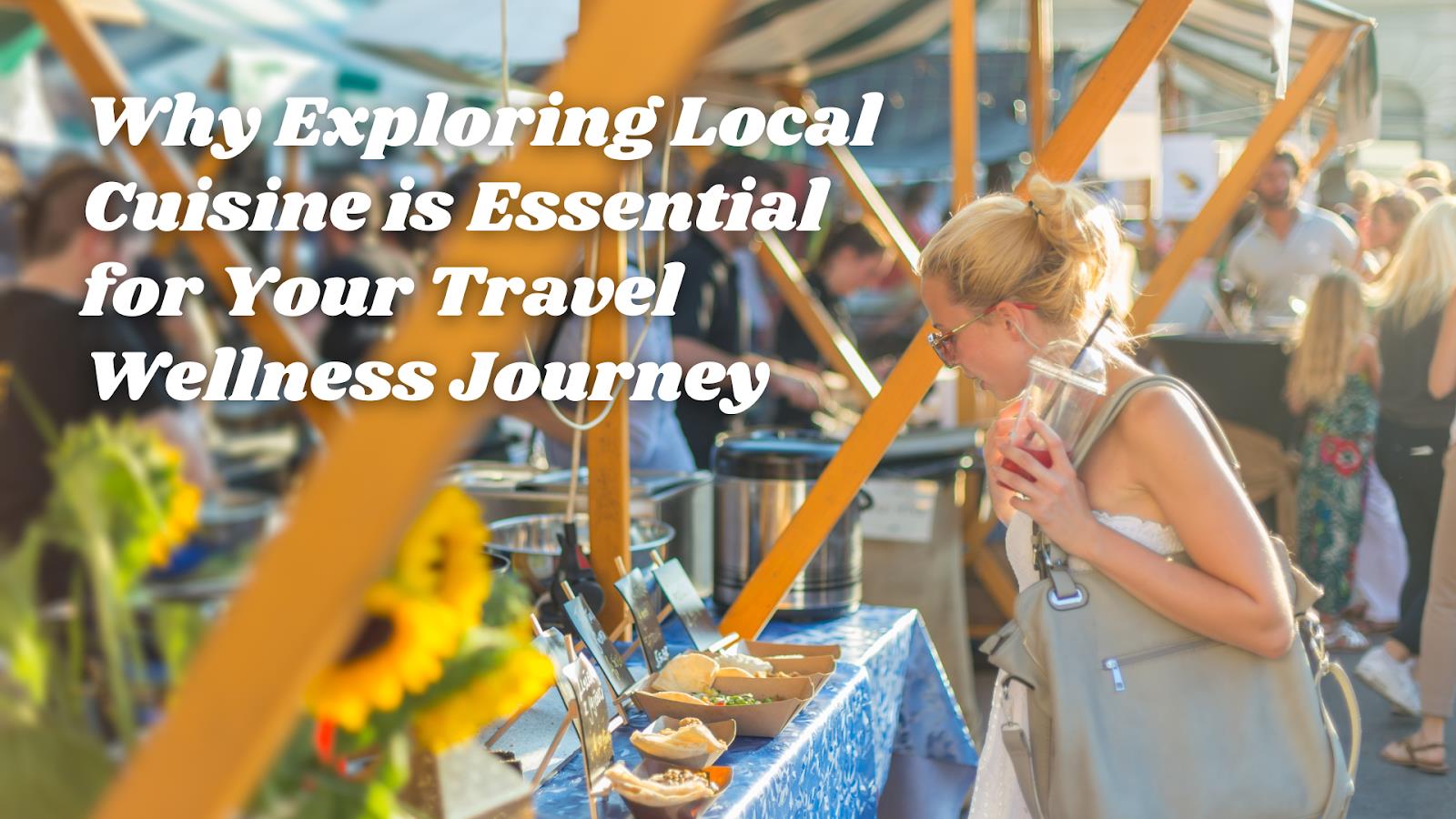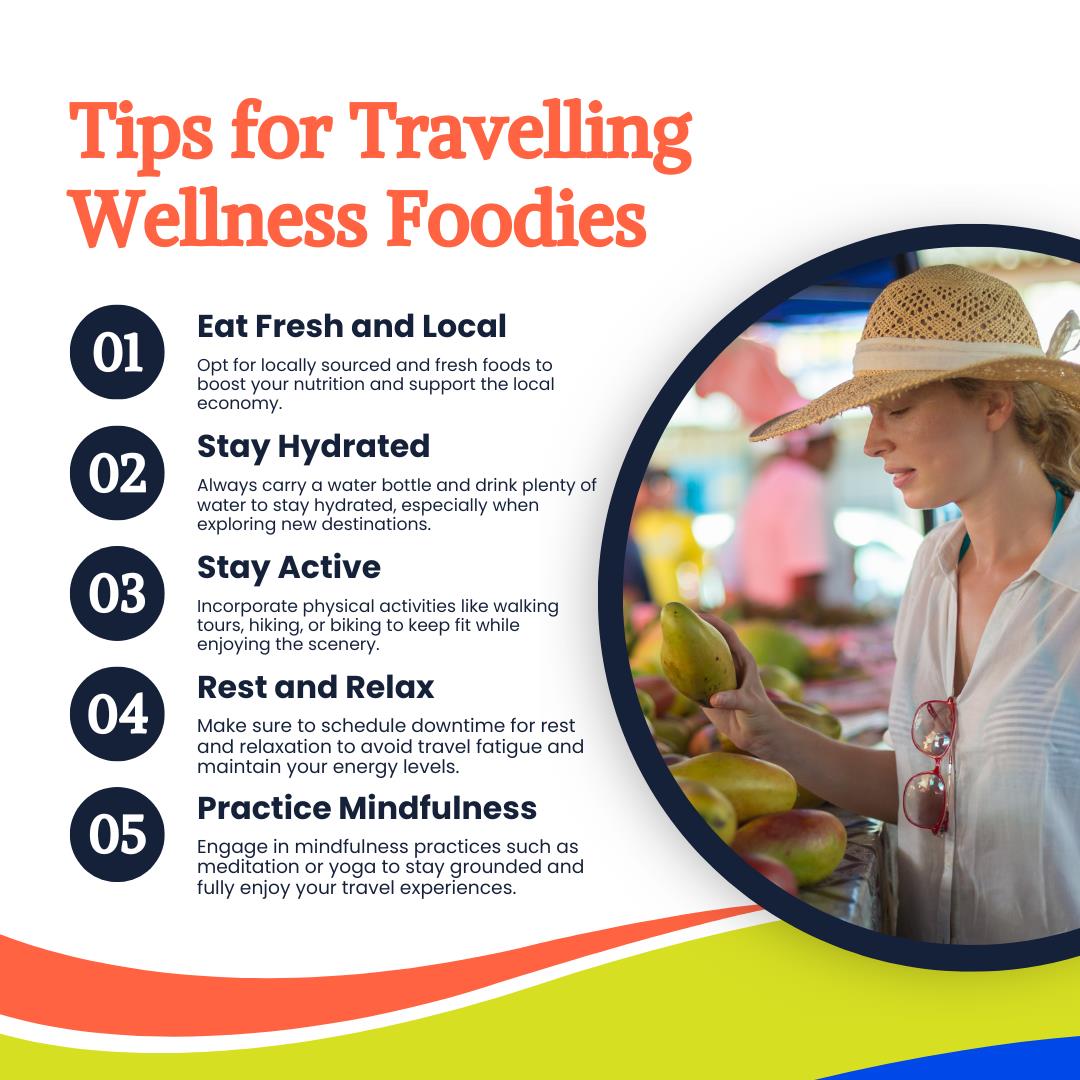Going to other places is really a treat for the senses, even for the tongue! Traveling involves more than just moving from one geographical location to another, taking pictures at tourist attractions, or purchasing souvenirs for loved ones. Food is an integral aspect of culture, and one of the best ways to experience a new culture is by tasting the local cuisine.

Sampling local food isn’t just about the flavors that tantalize your taste buds; it’s a crucial element of travel wellness, addressing your physical, mental, and social health.
Culinary Exploration and Cultural Understanding
Food holds a significant place in people’s lives and serves as a crucial element of every culture. Food is a history that depicts the history, geographical location, and culture of the society that prepares and consumes it. Tasting local meals helps you understand the cultural background of the place. For example, eating pho in Vietnam not only fills up your stomach but also helps you understand the culinary impact of France in Vietnam, the importance of using fresh ingredients, and more.
Gastronomy reflects centuries of culture and the wisdom of the people. In Italy, for example, pasta is not only food but it is also a symbol of the regional identity and family heritage. It has its differences as well such as the creamy pasta of Emilia-Romagna or pasta with seafood of the coastal regions of Italy. Similarly, engaging in these culinary traditions demonstrates respect for diverse cultural values
Physical Health and Local Ingredients
Travel wellness is closely linked to physical health, and local food can play a big role when it comes to this aspect. Most of the recommended traditional diets today encompass the use of fresh and whole foods that are usually healthy for consumption. The Mediterranean diet, the ones you would expect if you are planning for greece trips 2024, consists of foods like olive oil, fresh vegetables, and fish, is an example of how regional food choices positively affect bodily health.
When you eat locally sourced foods you are likely to be putting into your system foods that are fresh and contain more nutritional value as compared to foods that are trucked for long distances. For instance, Japanese staple foods mainly consist of fish, vegetables, and fermented foods hence leading to long life expectancy with minimal incidences of heart diseases. Touring around food enthusiast destinations implies that you will taste a number of cuisines that help to enhance your health.
Mental Well-being and Culinary Happiness
Exploring new foods can significantly contribute to improving an individual’s overall psychological health. Food is indeed a sensual commodity that, when consumed, provides delight and gratification, which is why food exploration is an essential part of traveling. The process of tasting something new, be it savory Thai som tam (green papaya salad) or fresh Mexican ceviche, is exciting and rewarding.
Moreover, it is known that taste carries a deep association with feelings and experiences. Having a meal with the locals or fellow travelers is an incredible way of creating unique memories and feeling connected. Such interactions are crucial for overall mental health as they include ways of human interaction and moments of happiness. Participating in cookery classes or food tours offers interactive opportunities to enrich your journey with knowledge and enjoyment.
Sustainable Travel and Local Consumption
Another factor that is crucial to travel wellness is the concept of sustainability. Consuming local food has a positive impact on the local economy and is the recommended approach when visiting a new destination. When you select locally-owned restaurants and markets for your meal, you support the locals who own the fishing boats, farms, and artisanal workshops.
This economic backing assists in the maintenance of food culture heritage and genetic variety to allow incoming generations to enjoy the very special food scenes.
Sustainable eating also includes concern with the number of food miles or CO2 emissions. Locally grown food requires minimal transportation hence the solution entails a direct reduction in greenhouse gas emissions. For example, savoring freshly caught fish in a coastal locale or relishing locally sourced food in the countryside ensures that you are adopting eco-friendly practices while traveling.
Local Meals and What to Explore
Do Your Research: While planning a vacation, glance at the eating habits of the people of that country and prepare a list of food items that one must try out. Such knowledge makes a difference, prevents one from missing the best the culinary scene has to offer, and enables a better decision-making process.
Visit Local Markets: A market is the central terrestrial entity and hub of a locality’s food system. It helps give a preview of daily life and an ability to taste new and original goods. Approach vendors, be inquisitive, and also take some of the products for a trial.
Take a Food Tour: Food tours arrange visits to selected restaurants that offer traditional dishes, and tour guides will give you background details on the meals you choose.
Attend Cooking Classes: They can work in cooperation with local institutions and teach people about local flavors and culinary practices. Furthermore, there are products that people can take home and share with their families and friends as well as new skills/recipes that they have learned.
Dine with Locals: For example, services such as EatWith or BonAppetour allow travelers to book a table with a local who will cook for them. This type of environment enables sharing of cultures and the ability to taste family dishes.
Be Adventurous but Mindful: When experimenting with new kinds of food, make sure to keep track of the restrictions and allergies you have. Bring medication if necessary and feel free to inquire about the contents.
Overcoming Challenges and Embracing the Experience
Traveling to explore local cuisine comes with its own unique concerns, especially for those with special dietary needs. However, these challenges can be avoided with good planning and an open-minded approach. It helps to learn a few phrases in the local language to help explain dietary restrictions and preferences. Above all, come to each meal with an open mind and a sincere appreciation.
Some people can also experience discomfort when it comes to tasting novel foods. Begin cautiously—taste something from a street stall, choose the most famous dishes to sample, and gradually advance. Keep in mind that the purpose of traveling is to make your journey as exciting as possible, not to endure discomfort. Embrace the process of learning and do not forget to have some fun.

Conclusion
Tasting the local food is one inherent part of the travel wellness experience which has various positive impacts on the physical health, mental health, culture, and the environment. It transforms travel into a sensory experience where each bite offers education, conversation, and pleasure.
Well, the next time you plan a vacation and pack your bags in preparation for the journey, try to consider the local foods. Leave your palate to guide you through the diverse cultures in your chosen travel destination and enjoy the benefits associated with soulful food. Nevertheless, as in any journey, taste is a step towards a more rewarding and meaningful experience. Bon appétit!
FAQs
In what way can trying local food help me improve my travel experience?
Tasting local dishes enriches your experience of the culture, makes you taste new food products, and helps you make new acquaintances. It transforms meals into an event and elevates your travel experience.
How would you suggest people safely experience local foods in the places they visit?
Sample local cuisine before you travel, go grocery shopping, go on foodie tours, attend cooking workshops, and eat with food servants. Travel boldly but targets specific diets, and it is important to grasp certain sayings in the local language.
How does consuming locally grown crops enhance the principles of sustainable tourism?
Among the benefits of consuming foods that are sourced locally, are enhancing the local economy, reducing one’s carbon impact, and encouraging sustainable travel. This serves the noble purpose of making sure that future generations are able to have access to the same unique food cultures.




Leave a Reply